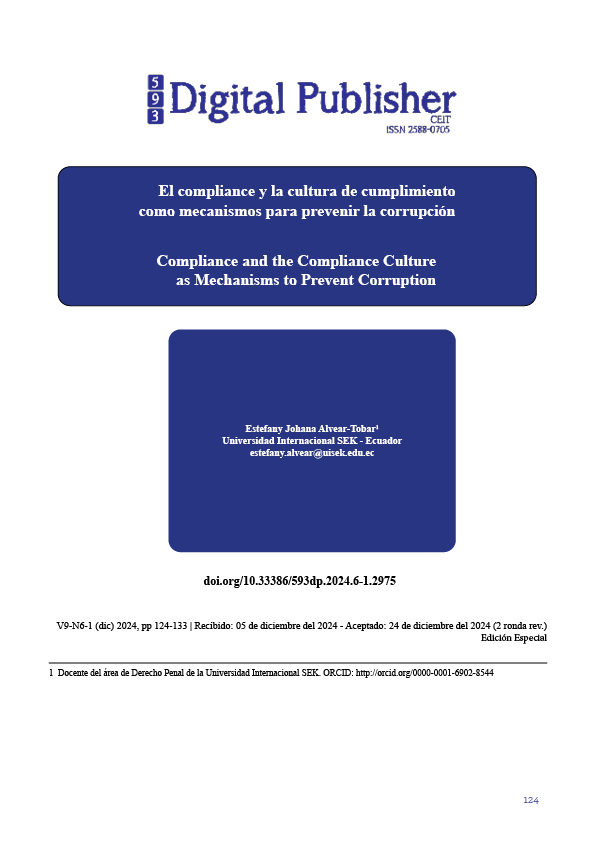Compliance and the Compliance Culture as Mechanisms to Prevent Corruption
Main Article Content
Abstract
Compliance refers to adhering to legal and ethical standards within an organization, aiming to prevent violations, including internal sanctions. It originated in the U.S. in the 20th century and became prominent in the business context after corruption scandals, with programs designed to ensure companies comply with laws. These programs are divided into specific areas such as tax compliance or criminal compliance and must be tailored to the specific needs of each company, avoiding "paper compliance", which refers to superficial programs with no real impact.
In addition to implementing programs, companies must foster a culture of compliance, where all employees adopt an ethical mindset, prioritizing regulatory compliance out of conviction. This culture also enhances corporate reputation, contributing to an image of an integrity-driven company. In Ecuador, the Comprehensive Organic Penal Code (COIP) has integrated compliance as a mitigating factor for criminal responsibility for legal entities, with requirements such as risk identification and internal controls. The fight against corruption, especially in the private sector, can be strengthened through the effective implementation of these programs, although their application in the public sector presents challenges, such as the lack of incentives to adopt this practice.
Downloads
Article Details

This work is licensed under a Creative Commons Attribution-NonCommercial-ShareAlike 4.0 International License.
1. Derechos de autor
Las obras que se publican en 593 Digital Publisher CEIT están sujetas a los siguientes términos:
1.1. 593 Digital Publisher CEIT, conserva los derechos patrimoniales (copyright) de las obras publicadas, favorece y permite la reutilización de las mismas bajo la licencia Licencia Creative Commons 4.0 de Reconocimiento-NoComercial-CompartirIgual 4.0, por lo cual se pueden copiar, usar, difundir, transmitir y exponer públicamente, siempre que:
1.1.a. Se cite la autoría y fuente original de su publicación (revista, editorial, URL).
1.1.b. No se usen para fines comerciales u onerosos.
1.1.c. Se mencione la existencia y especificaciones de esta licencia de uso.
References
Azzolini, A. (2020). Responsabilidad penal de los entes colectivos. El papel del compliance en la responsabilidad penal de las organizaciones. Criminalia, 743-761.
Bacigalupo, S. (2021). Compliance. Eunomía. Revista en Cultura de la Legalidad, 260-276.
Bacigalupo, S. (2021). Cultura de cumplimiento e integridad. The economy journal.
COIP, Ley 0 (Registro Oficial Suplemento 180 10 de febrero de 2014).
Darnaculleta i Gardella, & Mercé, M. (2015). La autorregulación regulada en la doctrina anglosajona y continental - europea. Autorregulación y sancionales, 55-72.
Engelhart, M., & Ulrich, S. (2014). Compliance Programs for the Prevention of Economic Crimes: An empirical survey of german companies. Berlín: Duncker & Humbolt.
Fernández Mesías, V. (2021). Cultura ética organizacional para la sostenibilidad de los programas de compliance. En B. Pareja García, J. M. Gracia de Castro, & P. De Pitta Simoea, Compliance y lucha contra la corrupción en España, Portugal e Iberoamérica (págs. 31-41). Madrid: Dykinson.
Gallego Soler, J. I. (2014). “Criminal Compliance” y proceso penal. En J. C. Hortal Ibarra, Responsabilidad de la empresa y compliance: programas de prevención, detección y reacción penal (págs. 195-272). Madrid: BdeF.
García Cavero, P. (2018). Compliance y Lavado de activos. En A. Calcina Hancco, Responsabilidad penal de la empresa y Compliance Program (págs. 151-155). Santiago: Ediciones Olejnik.
González Hurtado, J. A., & Martínez García, E. (2021). El aseguramiento de los sistemas de gestión de compliance a través de auditprías de tercera parte. En F. y. De Lacerda Da Costa Pinto. Madrid: Dykinson.
Internacional, T. (31 de enero de 2023). Transparency International. The global coalition against corruption. Obtenido de https://www.transparency.org/en/cpi/2022/index/ecu
Lizarzaburu Bolaños, E. y. (2021). Introducción al Compliance normativo empresarial. Valladolid: Universidad de Valladolid.
LOSNCP. (2008). Registro Oficial No. 395.
Oficina de las Naciones Unidas contra la droga. (2018). ¿Cómo podemos prevenir la corrupción? (pág. 13). Bogotá: ONU.
Puyol, J. (2017). Guía para la implementación de compliance en la empresa. Barcelona: Wolters Kluwer.
Serrano Zaragoza, O. (2018). Compliance penal y responsabilidad civil y societaria de los administradores. Madrid: Wolters Kluwer.
Transparencia Internacional. (31 de enero de 2023). Transparency International. Obtenido de https://www.transparency.org/es/press/2022-corruption-perceptions-index-cycle-corruption-organised-crime-instability-americas.


